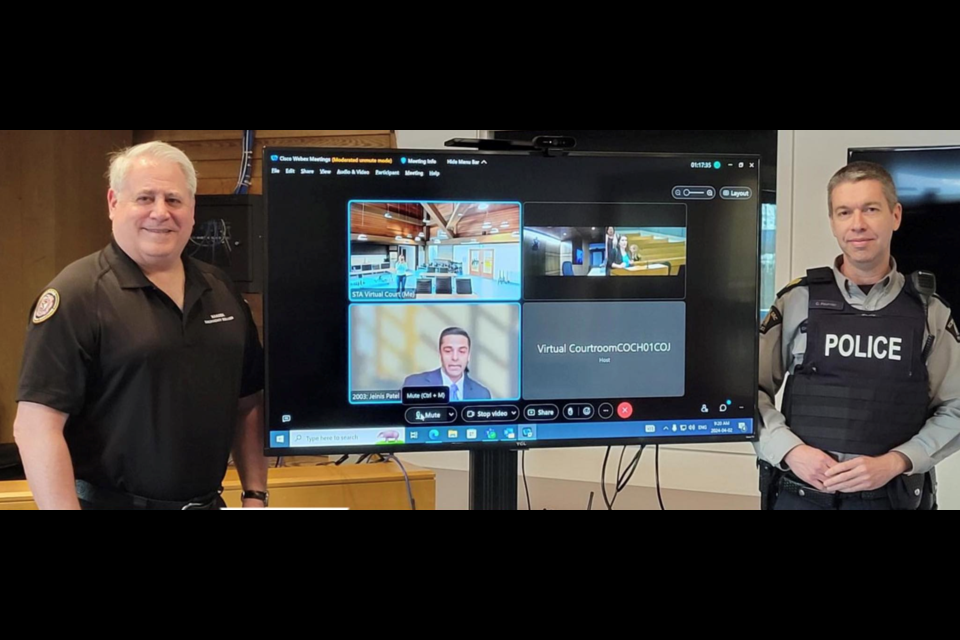Provincial court is in session in Mînî Thnî.
Twice a month, council chambers at the Stoney Tribal Administration building will host virtual provincial court proceedings that would have otherwise required Îyârhe Nakoda First Nation members to travel to Cochrane.
“We reached out to Cochrane RCMP inspector Dave Brunner and together we worked hand-in-hand to develop – along with Crown prosecutor Vince Pingatore – a virtual court to benefit Îyârhe Nakoda Nation members, who, for whatever reason, needed to be in provincial court and who may not have the transportation resources to get to court,” said Reg Fountain, Nakoda Emergency Services director.
The first session was held in April and proceedings will occur on the first and third Tuesdays of each month, where necessary.
Fountain called the move a “first step” in supporting culturally relevant restorative justice in the First Nation community.
Before the first session was called to order, a pipe ceremony and smudge were held in council chambers to honour Îyârhe Nakoda culture and tradition to remove any negative energy and ensure the space is used for the provision of justice, with honesty and transparency.
“We’re now having individuals able to conduct any legal business with the provincial court from this space,” said Fountain. “The next step would be to further efforts to establish the restorative justice principles of the healing circle and sentencing circle, and be able to conduct those summary court cases – where bylaws have been broken in, so individuals can respond to that level of crime.”
A healing circle and sentencing circle are initiatives being undertaken by a local justice committee involving Nakoda Emergency Services and members of each of the three Îyârhe Nakoda bands – Chiniki, Wesley and Bearspaw first nations.
The committee’s work focuses on community-based approaches that involve victims, offenders and the greater community in the justice process. Practices would focus on repairing harm and promoting reconciliation rather than just punishing an offender.
The aim would be to apply restorative justice principles to summary offences, which are typically less serious crimes, such as bylaw violations.
Part of the committee’s work is to develop bylaws. Bylaws would then potentially be carried out by a local tribal police force, in conjunction with RCMP.
The Nation is currently working toward developing a tri-services building that would host local fire services, EMS, Stoney Nakoda RCMP and a new tribal police. Stoney Tribal Council entered into funding agreement discussions with Public Safety Canada in 2021 for the construction of the facility, however, negotiations are still underway with the federal agency responsible for RCMP, as well as with Alberta Health Services and Indigenous Services Canada.
“When a tribal police force is established, there will be laws in place that they will then be able to enforce, in addition to those summary offences that may be for things not covered by bylaws,” said Fountain. “For instance, anything covered under the provincial Traffic Safety Act.”
Mînî Thnî is currently served by a satellite detachment of Cochrane RCMP that opened in 2019.
As of recently, that facility now also provides services for criminal fingerprinting, photographs, criminal record and vulnerable sector checks. According to Cochrane RCMP, 305 criminal record checks were completed for Mînî Thnî residents in 2023.
“It’s basically a one-stop shop,” said Fountain. “Now Mînî Thnî residents don’t need to travel outside their community for fingerprints or photographs related to any court proceedings. It can all be done here.”
Additionally, legal aid, Nakoda Emergency Services protective services staff and Tsuut’ina – Stoney corrections staff will also be present at all virtual court proceedings to assist Nation members.
Tsuut’ina – Stoney corrections services are offered to Nation members as part of the First Nations collective G4 agreement created in 2017.
Staff can provide services in the Stoney language and provide counsel to anyone facing the justice system, whether on their day in court or with parole procedures.
“They also understand any trepidation that Nation members may have in coming to court, and even though it’s now easier because virtual court is offered in Mînî Thnî, corrections staff are still there to provide that level of support,” said Fountain. “Not legal counsel, per se, although they are well-versed in that capacity, but to help individuals understand what is said and what is meant as it comes to court procedures.”
Creating a virtual court in the community was approved by the Alberta Ministry of Justice and is supported by Stoney Nakoda RCMP. At present, there are no plans to expand the service to Mînî Thnî residents called to Canmore Provincial Court, however, Fountain said there are plans to develop similar capabilities in Eden Valley for residents there that may be called to provincial court in Okotoks.



